Cooking with alcohol is a method as old as human culinary history, and in all that time, white wine has always been a regular feature. Its inclusion in food is known to lift flavor and depth, making it one of the most exquisite ingredients available. And if you’re into classic Italian or French recipes, you’ve probably come across one or two ingredient listings that include white wine.
But not everyone can add it to their cooking for various reasons. And sometimes, you may find it tasking, wasteful even, to rush out for an expensive bottle of Chardonnay because of one dish. So, what do you do in such times? Easy! Pick a decent substitute for white wine right there in your kitchen or pantry.

White Wine Nutrition Facts
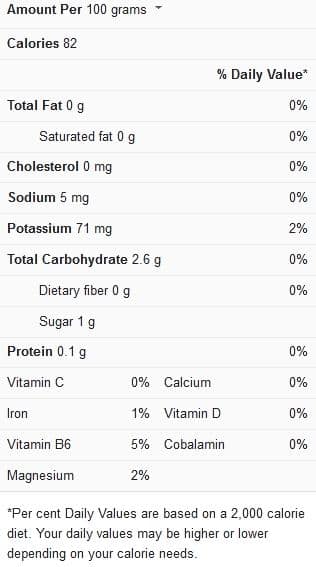
What is white wine?
White wine is derived by fermenting the non-colored pulps of grapes, and the fruits may be of any color. It is different from red wine because only the juice or wort is extracted without skin contact. The resulting wine may look yellow-green, straw-yellow, or yellow-gold, reminiscent of the parent grapes, varying from green or yellow grapes. And the common grape varieties used for this type include Chardonnay, Reisling, and Sauvignon Blanc.
Different white wines exist, and most of them are suitable for cooking. And their base profile includes a robust fruitiness with a hint of acidity. Generally, you’ll find two divisions of white wine, namely sweet and dry. The latter comes from complete fermentation, resulting in tang and aroma, while the process is interrupted in the former, leaving some sugars in the wine. And another class, named sparkling white wine, is produced while leaving the carbon dioxide from the fermentation process dissolved in the wine.
Uses of white wine in recipes
White wine is commonly consumed with meals, desserts, or an aperitif. But it’s also used in cooking procedures. The reason is white wine adds moisture to many dishes, and in some cases, can help tenderize items like meat or fish. It’s also a splendid option for adding depth to liquid recipes, though it’s recommended that the food is simmered, so the alcohol is completely burned off. But cooked meals aren’t the only places you’ll find this grape-based ingredient, as it’s also added to cold deserts.
White wine is used to deglaze pans after searing and balance fats in sautés, sauces, and soups. And it’s used as a wetting ingredient in slow-cooked meals, balancing the sauce’s fat and combining the meat’s flexibility. You’ll also find it a base for seafood like mussels, prawns, and oysters. And it’s an excellent addition to broths, bringing forth a robust flavor and aroma.
Many dishes incorporate white wine in their mix, and the below are good examples;
- Pasta
- Coq au Vin
- Baeckeoffe
- Stews
- Charcuterie
- Fondues
- Sauces
- Soups
- Marinades
- Chicken marsala
- Sauerkraut
- Osso Bucco
- Coq au Riesling
- Steamed mussels
- Riesling gelée
- Steamed clams
- Ice cream
- Braised chicken
- Baked apples
- Slow-roasted lamb shoulder
- Gratins
- Gnudi
- Garlic chicken
- Shrimp scampi
- Stuffed mussels
- Sauternes custard
- Chicken Basquaise
- Picatta
- Chicken and dumplings
- Chicken a la comtoise
White wine substitutes
While white wine is an excellent addition to meals, you can’t always use it in your cooking. Sometimes, you may consider your bottle of Riesling too expensive to splash into shrimp scampi. Or you don’t mind adding it to your dishes but don’t have a good bottle around and can’t rush to the store. Or you may be on a strict zero-alcohol diet and can’t use it in any of your recipes.
No matter the situation, you can achieve a fruity flavor and robust acidity in your cooking with these white wine substitutes. And you’ll find options that work for both sweet and dry white wines.
White wine vinegar
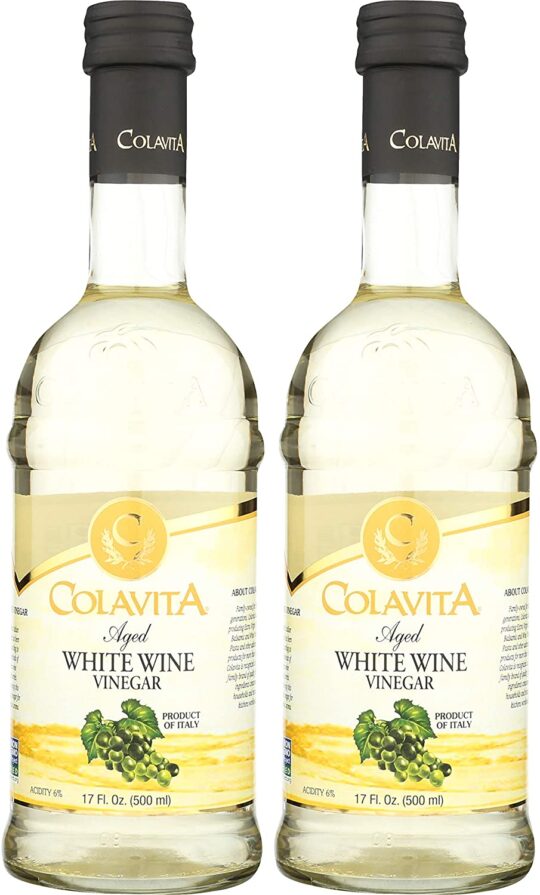
This option works best when dealing with a dish that requires dry white wine. As the name implies, white wine vinegar is derived from white wine, with one perk; it’s alcohol-free. So, you’ll get hints of the fruity grape flavors with zero alcohol in its composition, making it perfect for all users.
But white wine vinegar has higher acidity, so you’ll have to cut down on how much you use. A better way to keep its pH close is to dilute it with half part water. Once done, you can use this substitute in all recipes that call for white wine.
Chicken or vegetable stock
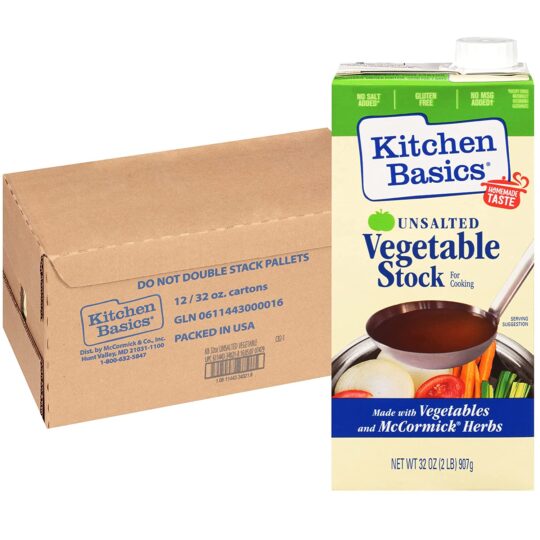
Stock is gotten by simmering meat, bones, vegetables, or seafood in water, resulting in an umami-rich liquid. And both chicken and vegetable stocks make fantastic substitutes for white wine. They’ll add depth to the recipe’s flavor, and you can pick between them for both vegan and non-vegan preferences. They’re also non-alcoholic, making them ideal for people with such preferences.
You can use equal amounts of stock to replace white wine in most recipes. But note that the taste will differ if the substitute contains salt. So, it helps to check the taste, so you’re sure the saltiness meets your preference in such cases.
White grape juice
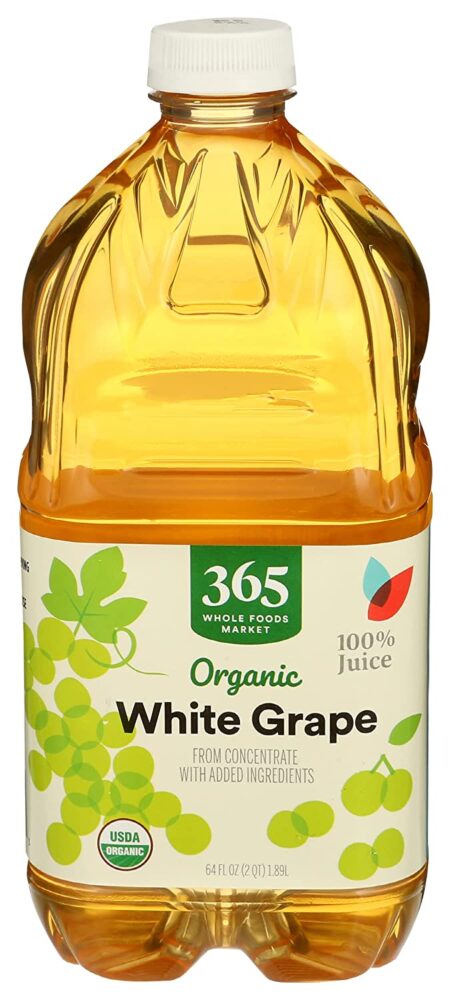
Since white wine is made from grape worts, another ingredient from the same source can also work. White grape juice shares a similar fruity flavor and color, perfect for replacing white wine in cooking. And it can be used in equal amounts, plus you won’t get any alcohol from it, so win-win.
But white grape juice is slightly sweeter than white wine. And while it’s a perfect substitute for sweet white wines, consider a dash of lemon or vinegar in it before using it in place of dry white wines.
Lemon juice

Do you seek a quick and easy solution for replacing white wine? Then, squeeze a couple of lemons, and you’re done! Lemon juice offers a tangy, fruity flavor and adds a good bout of acidity to dishes. Plus, it’s perfect for marinades and recipes where tenderization is required.
But lemon juice has a stronger tang than white wine, so dilute it with equal parts water before using. And it’s a splendid non-alcoholic option and works great for vegans.
Apple juice
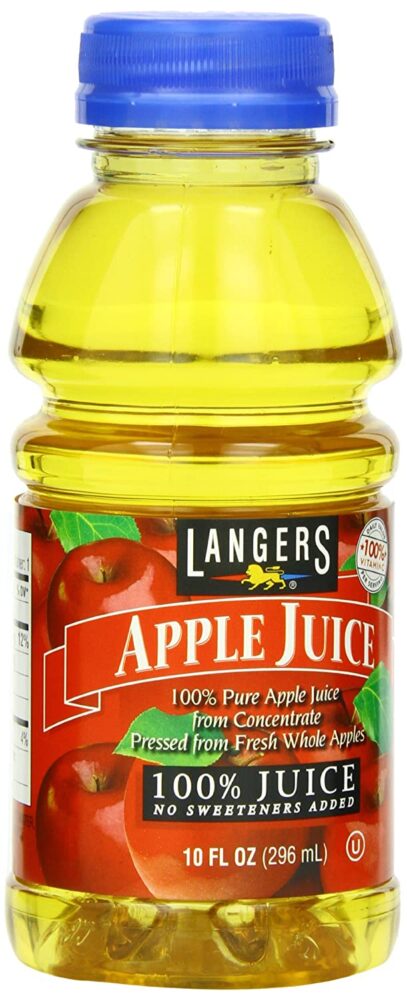
If you have a box of apple juice in the fridge, then use it the next time you’re out of white wine. Apple juice has a distinct sweetness and light color that reminds you of white wine. And it can be used in equal quantities, plus contains a bit of acidity, which drives its flavor closer to the real thing.
But only use apple juice in dishes that call for small quantities of white wine. The reason is the more apple juice you use in place of white wine, the more pronounced the apple flavor becomes. If you’d like more acidity in its mix, you can add a bit of vinegar to the juice before using it.
Frequently asked questions (FAQs)
What can I substitute for white wine in vongole?
Chicken broth makes an excellent substitute for white wine in vongole, and it adds depth and umami to the dish while keeping the flavor intact. But ensure that the broth isn’t salted so that you can adjust to your preference.
What do I use when a recipe calls for white wine?
You can use any of the substitutes listed above. But you can also consider apple cider vinegar, ginger ale, or water. And if you don’t mind using an alcoholic substitute, a bottle of dry Vermouth works excellently, especially for dry white wine.
How Long can you keep white wine for cooking?
White wine keeps for a long time, and during its viable period, you can add it to cooking procedures. You can cook with white wine whose bottle has been opened for two months or longer and still achieve fantastic results, even if it’s unfit for drinking.
Conclusion
Cooking with white wine adds depth and depth to lots of recipes, but you won’t always have the luxury of employing it as an ingredient. And in such times, you’d be grateful you learned about these impressive substitutes above. So, try exploring these options and pick the best one that suits your culinary and dietary needs.
